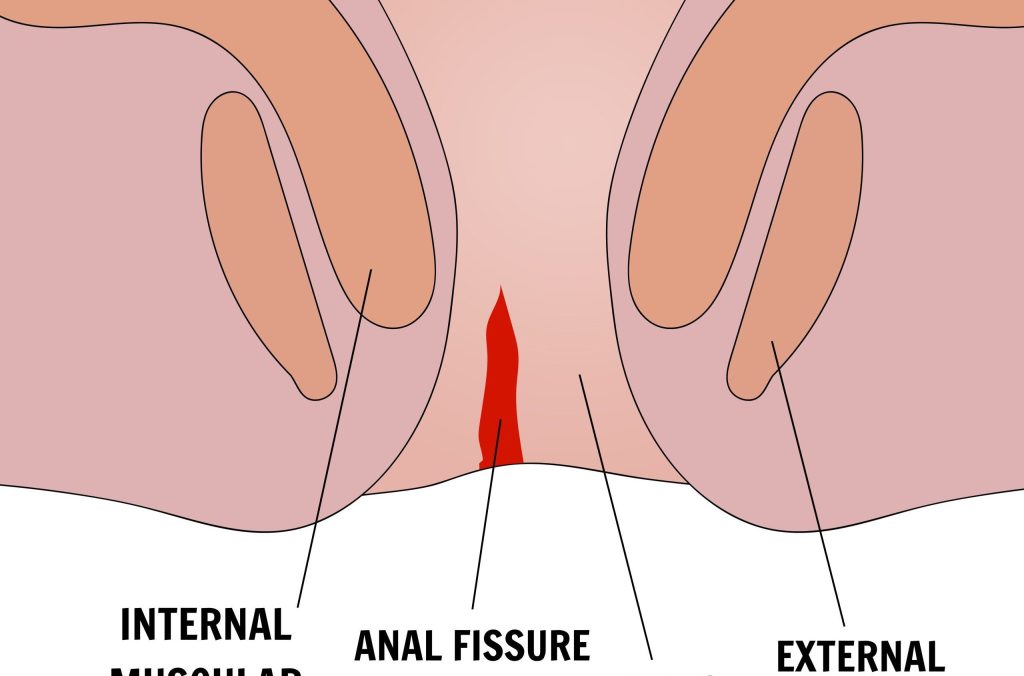An anal fissure is a tear in the mucosal lining of the anal canal, most commonly due to trauma from the defecation of hard stool. It can be classified according to its duration:
Anal fissures can also be categorized by whether they are primary (no underlying disease) or secondary (underlying disease e.g. inflammatory bowel disease).
Anal fissures are usually caused by inflammation or trauma to the anal canal. The major risk factors include:
Anal fissures are very common in infants, but they may occur at any age.
In adults, fissures may be caused by passing large, hard stools, or having diarrhea for a long time.
The condition affects males and females equally.
An Anal fissure can be seen as a crack in the anal skin when the area is stretched slightly. Anal fissures may cause painful bowel movements and bleeding. There may be blood on the outside of the stool or after a bowel movement
The medical management of an anal fissure involves reducing risk factors and providing adequate analgesia. The majority of patients do not requires surgery.
Measures such as increasing fiber and fluid intake will help. Stool softening laxatives (such as Lactulose) can be trialed if there is no change in stool following initial conservative management.
Surgical therapy is reserved for chronic fissures, where medical management has failed to resolve the symptoms after at least 8 weeks. Botox injections can be given into the internal anal sphincter, to relax the sphincter and promote healing of the fissure. Lateral Sphincterotomycan be performed, involving division of the internal anal sphincter muscle. Recurrence of anal fissures post-surgery is between 1-5%.

For comprehensive Fissure treatment in Goregaon or Fissure Treatment in Mumbai or its vicinity, consider scheduling an appointment with the esteemed Dr. Pradeep Shriyan. Distinguished as a senior laparoscopic, general, and gastrointestinal surgeon in the Mumbai Suburban region, Dr. Shriyan’s expertise lies in the specialized field of laparoscopic surgery.
Ensure your Fisssure treatment is in the hands of an accomplished professional by securing an appointment with Dr. Pradeep Shriyan in Goregaon and Malad today.
• Have nothing to eat or drink 6 Hours before surgery except for prescribed medications you have been told to take with a sip of water.
• Report 2 hours before the Surgery time (OT Procedure)
• Carry Doctor’s Case Paper on which treatment is written at the time of Admission to Hospital
• Carry Insurance Documents with you to the Hospital before Admission
• Do not apply any lotions, perfumes, deodorants, or Nail polish before surgery
• Take off your jewellery including earrings and piercings
• Don’t shave the area, this will be taken care by Hospital nurse
1. Take pain relieving and other medications as advised. Pain-relieving medication should be taken with food.
2. Follow-up with the doctor after a period of 10 days.
3. Eat a healthy diet and drink plenty of non-alcoholic and non-caffeinated drinks.
4. Do not operate any machinery, or lift any heavy articles after Surgery
5. Rest for a few days after the surgery is advisable, but keep mobile.
6. It is normal to have some bleeding after surgery, but if a significant amount runs down the leg, a doctor should be informed immediately.
7. Warm sitz baths may also help to reduce pain following surgery.
8. It is critical to stay hydrated and maintain a high-fibre diet in order to have easy and painless bowel movements
Please consult doctor immediately if you experience any of the following symptoms:
• Large amount of swelling under the wound • Foul odour from operated area • Fever greater than 38.0 degrees C.
Developed by PRAZONE Web Solutions
Copyright © 2024 All rights reserved by
Dr Pradeep Shriyan